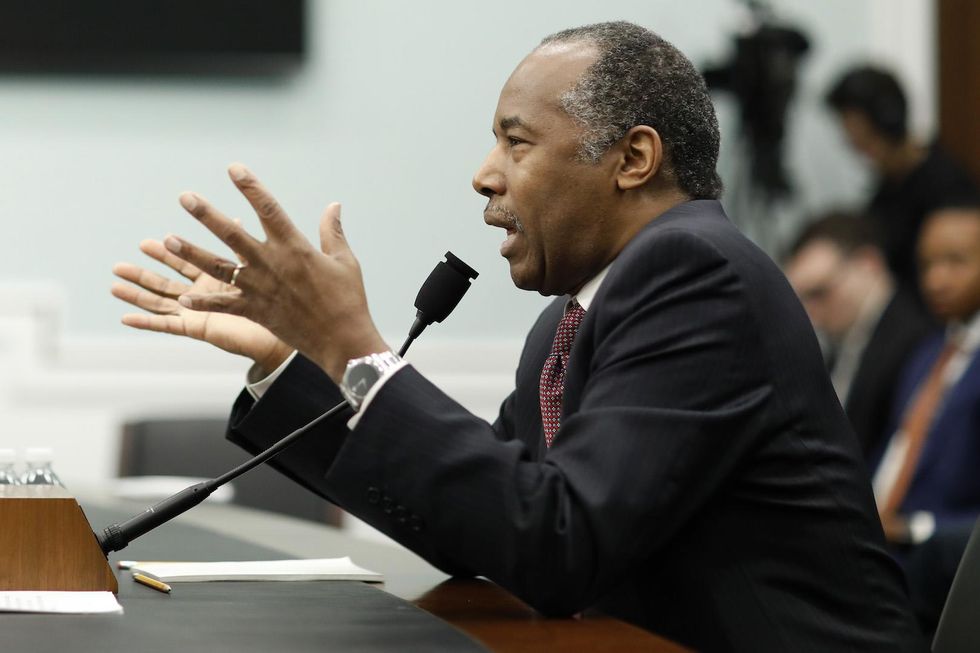
Secretary of Housing and Urban Development Ben Carson testifies on March 20 before the Subcommittee on Transportation, Housing and Urban Development, and Related Agencies on Capitol Hill in Washington, D.C. (Aaron P. Bernstein/Getty Images)

Since Ben Carson took over as secretary of the Department of Housing and Urban Development in January 2017, significantly more HUD properties have failed their inspections, and the department has been dangerously slow about improving conditions, according to an NBC News report.
Despite Carson's proclamation that he would fix the "rats, roaches, bed bugs, mold, lead and violence" in low-income housing communities, the failure rate of HUD properties has increased by 30 percent over the 2016 rate, according to the NBC News report, compiled by Suzy Khimm, Laura Strickler, Hannah Rappleye and Stephanie Gosk..
Additionally, some properties received passing inspections even with holes in the ceiling and uncontrolled black mold — and HUD officials blamed the inspection process.
"That's how you get a passing score with mold, vermin and a falling down bathroom ceiling — the system is broken," a HUD official told tenants in a recording of a meeting that was provided to NBC News and verified as authentic by HUD.
There appear to be several reasons for the deterioration of public housing across the country:
Lack of urgency by HUD: At least 12 HUD officials, who spoke anonymously to NBC News, said that there is a "climate of inertia" under Carson's leadership, with one official saying "There's no urgency on anything."
Higher inspection standards: In 2016, HUD instituted higher standards for repairs and inspectors, which HUD says has caused the increase in failed inspections.
Staffing issues: Under a hiring freeze put in place by President Donald Trump, HUD has lost hundreds of staff members. The department's enforcement office has been hit particularly hard, and that's the group that is supposed to hold the worst landlords accountable for substandard housing conditions.
"We just don't have the staff for it," a HUD official said in the recorded meeting. "There are 432 properties in Connecticut alone and I have — I have five staff."
According to the Government Accountability Office, HUD's enforcement office has completed 25 percent less work since 2016 and has failed to keep track of its caseload and to detail action taking on failing properties.
HUD has 480 fewer employees than it had at the end of the Obama administration, and the enforcement department has hit a 20-year low of 90 employees.
A department spokesman said HUD is in the process of bringing on 77 staffers to the Office of Multifamily Housing, and is recruiting for 48 other current openings.
Dependence on private landlords: HUD relies on privately-owned, publicly-funded properties, but the desperate need for properties gives landlords much of the leverage, even when they are dragging their feet on maintaining the residences. If a landlord promises to make repairs, HUD typically accommodates them, and is lax in enforcing deadlines.
"You don't pull levers to send shockwaves into the landlord communities," a HUD official told NBC News, explaining why HUD is hesitant to pull contracts or fine landlords. "We need these landlords."
Meanwhile, even failing landlords profit immensely from the arrangement with the government. For example, Blima Isaacson, owner of Infill apartments in Hartford, Connecticut, continues to enjoy the benefits of a 20-year, $14 million contract with HUD, despite failed inspections and slow repairs and having 24 units deemed "life-threatening."
HUD spokesman Jereon Brown told NBC News that the department is "under new marching orders from Secretary Carson to redouble our enforcement efforts against those who violate our rules."
Meanwhile, Carson has advocated for loosening inspection requirements to entice more landlords to participate in the Section 8 voucher program, and wants to raise rent to encourage self-sufficiency among tenants.